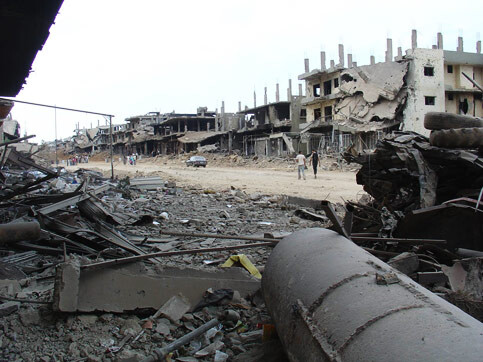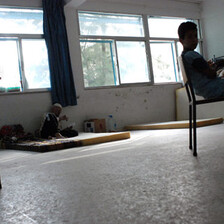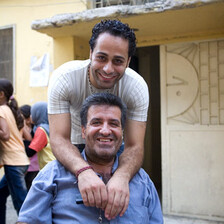Nahr al-Bared refugee camp 26 October 2007

In the “new camp,” the main road of the camp that a few years ago used to connect Tripoli up to the Lebanese-Syrian boarder. This road was lined by hundreds of shops that serviced not only the camp residents, but also those in the adjoining villages of Akkar, 14 October 2007. (Anonymous)
“Don’t ask what they stole, ask what they left,” dryly jokes Khaled, a Palestinian refugee from Nahr al-Bared camp in northern Lebanon. It was evident from what remained of the crown molding along the ceiling that his three-story house was once grand. Now, only one year after the seven-year process of building the house was completed, the structure is largely destroyed and its contents looted.
The middle-aged video-maker and editor asks, “the battle never reached this far, so why did they burn my house?” The area where Khaled lives was claimed by the Lebanese army during the first days of its fighting that would last for fifteen weeks against the militant group Fatah al-Islam that had established itself in the camp. During the siege Khaled photographed from the nearby highway Lebanese soldiers occupying his home and saw that there was no damage sustained to the house. The day the battle between the army and Fatah al-Islam officially ended, the victorious Lebanese army paraded down the highway, greeted by Lebanese citizens from the nearby villages, many of which lost their soldier sons during the siege. From the highway, Khaled saw soldiers doing something to his house, though he couldn’t tell exactly what, while the crowd was cheering them on.
When he returned to his house a week and a half ago, Khaled found that it had been completely looted, including the appliances in the kitchen, which was destroyed by shelling. Additionally, fuel had been thrown onto the remaining walls and everything flammable in the house was put in the center of the rooms and burned. The iron front door had been blasted open and all of Khaled’s furniture, his television and appliances, bed furnishings, and even the olive oil, were stolen from the house.
However, what he did find were a dozen washing machines and a dozen fridges, all of them taken from his neighbors’ houses. Because of his home’s close proximity to the highway, he reckons that it was a strategic place for the looting army, or whomever they let in to do the stealing, to take their bounty from the camp. “Import/export from Nahr al-Bared to China and Indonesia,” Khaled jokes. Also indicating the systematic nature of the looting, a neighbor found 25 televisions being stored in his house. The appliances were eventually matched with their owners, though Khaled is currently making use of an unclaimed washing machine until its owner comes to collect it.
Displaying the deeds of ownership for the land on which his house is built, Khaled finds the situation to not be without irony. It could be the plot to an Egyptian film comedy by the famous actor Adel Imam, he says, as eight members of his family are now sleeping in the one habitable room of a home that was once a palace by refugee camp standards. Although otherwise immaculate, there is still fuel on the walls despite four days of scrubbing. The sparse decor includes a photograph of Khaled’s son, a student at a nearby technical university, that was found outside after it fell off a piece of furniture apparently looted from the house. Also on the walls is a verse written by a poetic soldier lyrically urging the Palestinians to go back from where they came. Although living eight to one room is not a good situation for any family, for them it is a preferable alternative to staying in the kindergarten in nearby Baddawi camp, where they had sought refuge during the siege, along with other families.
One doesn’t have to walk very far into Nahr al-Bared to see that Khaled is among the camp’s more fortunate. Families’ private spaces are now totally exposed by blown off walls, revealing prized furniture now under rubble, like some kind of absurd dollhouse. Many camp residents compare the damage to that of an earthquake, though the destruction here is man-made. They are also not hesitant to draw parallels between the actions of the Lebanese army here in the camp and the army occupying their homeland to the south. Indeed, if it weren’t for the Lebanese flags proudly planted atop the ruins of the camp, which is surrounded by often hostile Lebanese army and security forces checkpoints, the scene could just as easily be from Rafah, Gaza. Indeed, more than 40 civilians from the camp, home to 30,000, died during the army siege as well.
And like the Israeli army is in Palestine, the Lebanese army seems assured that it will not be held accountable for its actions here in the camp. Various commando units within the army have even signed their individual or unit names on the walls, where they have not written threats or curses to the Palestinian residents.
“They even stole the doors,” complains a woman called Hajja Nada as she gives a tour of her soot-filled home. Looters took all of her furniture; only a built-in cabinet in the dining room remains, though the glass panels were all shattered. Hajja Nada is no stranger to starting over from scratch. Fifteen years ago, her family fled Iraq during the Gulf War and of course, that was after their original displacement from Palestine in 1948. Most professions are off limits to Palestinian refugees in Lebanon, or they aren’t able to find jobs because of institutionalized discrimination. So Hajja Nada’s husband is not able to utilize his training as an engineer and the only work he has is the occasional labor job with the UN agency for Palestinian refugees, UNRWA. Because that irregular income is not enough for the couple to continue to afford the $250 per month rent for the apartment in which they were living in nearby Baddawi refugee camp during the siege, Hajja Nada is now back in her badly damaged home.
Those who have returned to their partly destroyed homes are suffering health complications as a result of the unhygienic conditions. A medical worker with the Palestine Medical Relief Society described returnees as suffering from stomach problems like dysentery and diarrhea as a result of contaminated water. Skin and eye conditions are developing because of the fuel-soaked and soot-stained walls. The society’s makeshift clinic receives many people injured by cutting themselves on debris while cleaning out their houses. The room in which the clinic is treating patients is itself burnt out, and the society is hoping to soon move to a more hygienic space.
At another community-run clinic, which is operating out of the damaged house of a volunteer’s sister, another volunteer explained, “we have to focus on the inadequate humanitarian response. Non-governmental organizations visit, look and then leave - we need stronger involvement and practical relief.” The Lebanese government and international human rights and relief organizations assured assistance to the residents of Nahr al-Bared during the siege, residents say, but now that people are returning to the camp there is little evidence that these promises have been fulfilled. UNRWA hired contractors to assess the infrastructure in the camp, spray-painting symbols indicating the level of damage of each structure, and there are is the occasional poster pasted up on walls decoding the system. Water tanks boast the logos of UNRWA and the EU but on the writer’s visit to the camp, only a few men wearing Islamic Relief vests were visible in and there was little other evidence of incoming aid. The volunteer at the clinic explains, “Only the camp’s organizations are sweating and working but there are not even enough wheelbarrows available.”
During the siege, there was an “excess of relief” flowing into Baddawi camp and food was spoiling before it could be consumed. The volunteers say that in Nahr al-Bared families are only receiving one meal a day (“Rice, rice, and more rice,” one young man complains) and it is speculated that “there was an excess maybe to keep them there [the displaced Nahr al-Bared refugees in Baddawi]. Here, there’s been very little aid, and promises have not been realized.”
Nahr al-Bared’s refugees also feel abandoned by the Palestinian political factions, as well as the PLO which aligned itself with the Lebanese army’s anti-terrorism line lest it appear sympathetic to Fatah al-Islam. It is not lost on the residents that shortly before the siege the PLO was seen as signaling for the first time that the Palestinian refugees’ right of return is negotiable. “Up until now, we’ve seen nothing from them,” says one of the volunteers. “There’s a wider game to diffuse political will for the right of return by pressuring people to emigrate,” says his colleague.
Indeed, there are many more questions than there are answers in Nahr al-Bared. “Why aren’t journalists able to enter the camp?” asks the same volunteer, referring to the army’s ban on media and cameras entering the camp. Alluding to the virtual media blackout in the Lebanese press on the army’s post-siege destruction of Nahr al-Bared, he adds, “And why aren’t the journalists trying to come in here?”
A cloud of suspicion has hung over the battle at Nahr al-Bared from the very beginning of the siege, prompted by the previously unheard of Fatah al-Islam group allegedly robbing a bank and brutally attacking soldiers at an army checkpoint, though reports on these events are inconsistent and sometimes contradictory. After the siege ended, it was reported that Fatah al-Islam’s more than 200 dead in addition to some Palestinians and Lebanese, included nationals from all over the Middle East and North Africa, some of them said to have fought in Iraq. Rival Lebanese political parties have accused each other of supporting and arming the militant group. Even the hateful graffiti left by the Lebanese army in Nahr al-Bared grants that Fatah al-Islam is not a Palestinian group, but still condemns Palestinians for “hosting” the group, something that Palestinians vehemently deny and is contradicted by Palestinian authorities handing captured Fatah al-Islam fighters to their Lebanese counterparts.
In any case, the fighting ended over a month ago, yet smoke billowing over the “old camp” area of Nahr al-Bared, still closed by the army, indicates that homes continue to be burnt in that part of the camp. Camp residents, many of whom monitored the status of their homes by photographing them during the siege, testify that their houses were burned as many as two weeks after the fighting in the camp ended. “The damage was systematic and complete; every house has had this done to the point where people can’t move back into the house,” the volunteer explains. “There was an element of revenge and hatred - everything they couldn’t take they shot and destroyed. I’m not sure if it was a specific policy but the Lebanese army is as sectarian and divided as anything in Lebanon, and there is old hatred,” adds his colleague, referring to the Christian militias responsible for the massacre of Palestinians in Sabra and Shatila refugee camps in 1982 and Tel al-Zaatar refugee camp in 1976.
As Palestinians rehabilitate what remains of their homes and start over again, their laundry hanging on clotheslines a symbol of perseverance as meaningful as any flag, the evidence that might prompt an investigation will be cleaned up as well. Fearful that the wanton destruction of the camp is just another page of the Palestinian refugees’ history of constant vulnerability and displacement — hundreds of Nahr al-Bared’s residents were already displaced from the previously destroyed camps in Lebanon — they express their wish to preserve their homes, community, and national cause. At the clinic one of the older men declares, “Despite all of this … we will continue to stay here and resist and remain steadfast … We will rebuild the camp, even if it’s with our own hands.”
Currently based in Lebanon, Maureen Clare Murphy is Managing Editor of The Electronic Intifada.
Related Links





